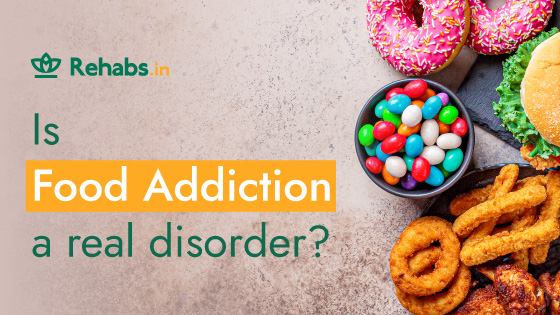Is Food addiction a real disorder?

We have all heard about drug addiction, alcohol addiction, tobacco addiction, but food addiction? Is that even a real thing? To understand this practically, let us go through a typical day of eating of Miss A who is an advertising professional and Mr B who is a gym instructor.
Miss A | Mr B |
| 7:00 am – Banana Chocolate Smoothie | 10 hardboiled egg |
| 9:00 am – Chocolate pancakes | Egg white omelette |
| 11:00 am – Chocolate coated raisins | Raw egg with milk |
| 2:00 pm – Large fries with chocolate ice cream | Egg salad |
| 5:00 pm – Cold coffee with chocolate syrup | Egg and chicken sandwich |
| 8:00 pm – Pizza with chocolate donuts | A glass of milk |
Who do you think has food addiction? Clearly, Miss A, you would say, as she has been binging on chocolates in some form or another the entire day. However, so is Mr B, he has been having eggs the entire day in some form or the other. But well, chocolate is sweet and that much sugar isn’t good for health, so it’s bad. Eggs on the other hand are a good source of protein and proteins are the building blocks of our body. But then again, proteins are high in calories and unused protein turns into fat deposits. Then again, chocolate is tasty and eggs, not that much. Really? Who’s to decide?
Are you confused? You are not alone. Food addiction is one of the most controversial subjects in the scientific community. There is no collectively recognized clinical definition of “food addiction,” and the Diagnostic and Statistical Manual of Mental Disorders (DSM-5) does not even list it as a condition.
According to one study, over 5% of the population may suffer from food addiction and it occurs in nearly 7% of women and 3% of men. It is prevalent in 2% of under/normal-weight people and 8% of overweight/obese people. Women between the ages of 45-64 years have an 8.4% prevalence rate, while those between the ages of 62-88 years have a 2.7% prevalence rate.
Food Addiction: Let’s dig in!
Before we try to comprehend what is “Food addiction”, let’s understand the word, ‘addiction’. The Merriam-webster dictionary defines addiction as, “a compulsive, chronic, physiological or psychological need for a habit-forming substance, behaviour, or activity having harmful physical, psychological, or social effects and typically causing well-defined symptoms (such as anxiety, irritability, tremors, or nausea) upon withdrawal or abstinence: the state of being addicted”.
Research papers published over the years have identified that palatable foods (foods that are high in fat and sugar) stimulate the same parts of the brain and exhibit the same neuronal activities as illicit substances. For e.g., a pack of chips and a hit of coke can both result in the release of dopamine and endogenous opioids, hormones that are naturally produced in the body. These hormones are a part of the “reward system” — or the mesolimbic circuit — in the brain, which is in charge of motivation, wants, desires, and cravings.
Some of the behaviours associated with “food addiction” include:
· Compulsive overeating, even when not hungry
· Cravings for fatty and sweet food products
· Inability to control food intake
· Binge eating and disordered eating patterns
Why is the concept of food addiction so debated?
Food addiction continues to be a controversial subject in the scientific community due to unconvincing evidence from many studies. Some of the arguments are as follows:
The brain on food vs. drugs: An important difference
Food and drugs stimulate the reward system and pleasure centre in the brain, but so do activities like listening to music, laughing, making love, etc. Does it mean that these activities can also be addictive? Also, a critical point to note is that foods do not wield the same pharmacological effect as drugs.
Which nutrient in the food is the drug?
Researchers haven’t been able to pinpoint which nutrient or combination of nutrients can cause food addiction. Studies in rats showed that a food regime high in fat and sugar (like many processed foods) may encourage addiction-like behaviours. However, long-term studies in humans are necessary to identify any problematic food combinations.
The connection between obesity, palatable foods, and food addiction
Some studies suggest that food addiction is a reasonable cause of obesity, and the food addiction model even stresses being obese as one of the clinical criteria. A few researchers have also linked food addiction with eating disorders like binge eating disorder (BED). However, one review observed that a considerable number of people with BED did not have obesity and that most people with obesity did not go through disordered eating or food addiction symptoms.
Food addiction can be real for people suffering from it
Experts haven’t been able to find a clear answer to whether “food addiction” is a form of disordered eating or compulsive behaviour that is comparable to drug addiction. However, for the many people who simply cannot control the desire to continuously eat high calorie, low nutrient food or for that matter even copious amounts of healthy food, “food addiction” can be a real thing for them and their voice matters.
Following are some of the signs of Food Addiction:
· Eating in the absence of hunger
· Eating till you may want to purge
· Feeling anxious when certain foods are not available
· Eating takes preference over spending time with family and friends
· Eating food isn’t any longer a pleasure thing
· Eating food results in feelings of depression, self-hatred or guilt
How to treat Food Addiction
There is no definite way to treat “food addiction” as it is still not considered a true disorder. Also, trying to recover from food addiction is not the same as trying to recover from other types of addiction. For e.g., you can try to recover from alcohol by abstaining from drinking alcohol. However, you cannot recover from food addiction by simply not eating food because food is essential to staying alive.
Medical professionals, especially those who are in the fields of nutrition, as well as psychologists who understand addictive behaviours can help identify solutions for food addiction issues. One can also attend Food Addicts Anonymous. Along with the principles of the 12-step program, one has to follow a strict diet that excludes ingredients, like sugar, refined flour, and wheat.
One can also try and modify one’s environment by not having restricted foods in the house and instead have healthy food options handy at all times. On social occasions, try concentrating on having fulfilling conversations rather than focusing on what’s at the dinner table.
The many individuals who are in therapy for food addiction issues will concur that food addiction is a real disorder. There are enough studies to support that certain foods can lead to neurological changes and impaired control. Moreover, behavioural and substance-related characteristics of food addiction seem to be linked, especially when it comes to highly-palatable food components. Overall, more research is needed to decide whether food addiction can be termed as a disorder.
In closing, let’s circle back to Miss A who eats chocolate-based food products throughout the day and Mr B who eats eggs throughout the day. If Miss A is physically fit, has no health complications and eats out of a desire for chocolates rather than compulsion then yes, she doesn’t have food addiction issues. However, if she is highly diabetic and eating sugar can kill her and yet she continues consuming chocolates then well she has food addiction problems. It’s the same with Mr B. If he continues to eat eggs throughout the day without enough exercise and is overweight, then even healthy hard-boiled eggs can be considered an addictive substance. In the end, the environmental situation, physical wellbeing and mental response, all need to be factored in when deciding if one has food addiction or not, or if it’s even a real disorder.
Sources:
Alexis. A,. Beake.J, (2021, June) Is food addiction real? www.medicalnewstoday.com
Pelchat. M., (2009, Jan) Food Addiction in Humans. The Journal of Nutrition, Volume 139, Issue 3. https://academic.oup.com/
https://academic.oup.com/jn/article/139/3/620/4670400?login=true
Lerma-Cabrera.J., Carvajal.F., Lopez-Legarrea. P., (2016, Jan) Food addiction as a new piece of the obesity framework. https://nutritionj.biomedcentral.com/
https://nutritionj.biomedcentral.com/articles/10.1186/s12937-016-0124-6
Gordon.E., Ariel-Donges. A., Bauman. V., Lisa J. Merlo. L., (2018, April) What Is the Evidence for “Food Addiction?” A Systematic Review.
https://www.ncbi.nlm.nih.gov/pmc/articles/PMC5946262/
McQuillan. S., Frye. D., (2019, Sept) Is Food Addiction a Real Thing? https://www.psychologytoday.com/
https://www.psychologytoday.com/us/blog/cravings/201909/is-food-addiction-real-thing
Goodman. B., Casarella. J., (2020, July) Food Addiction. https://www.webmd.com/
Definition of addiction
https://www.merriam-webster.com/dictionary/addiction

















